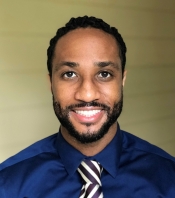New joint faculty member excited about finding interdisciplinary solutions

iStock photo by Getty Images
Like about 98% of college football players, James Wright realized as he wrapped up his career playing wide receiver for the University of Southern California that he wasn’t destined to play professionally.
“It allowed me to see that education was important,” said Wright, a new Arizona State University associate professor and the first joint faculty member of the School of Criminology and Criminal Justice and the School of Public Affairs. He said a coach helped guide him with a question.
“During my junior year, he asked, what was I passionate about?”
Wright discovered his answer was public policy, education policy and law. From his Bachelor of Science in public policy, planning and management from USC, the Culver City, California, resident went on to earn a Master of Public Policy with a specialization in economics from Pepperdine University, then a PhD from American University, where his research included criminal justice. His doctoral dissertation was about police officers’ body-worn cameras.
His PhD was a first for his family.
“I didn’t know what a PhD was until I got into my master’s program,” he said. “I had to get a (teaching) job to pay my bills. I applied to the PhD program, but even then I didn’t think I’d enter the academy.”
In fact, Wright was nearly two years into teaching when he decided that teaching is where he wanted his career to go permanently.
“I wanted to have an impact on students. This is what I wanted to do,” he said. “It’s when you get that email from a student that says, 'Hey, I got the promotion; hey, I got the job.' That is what brings me happiness over anything else, because I made an impact.”
Wright said he doesn’t judge his success based on how many compliments he receives, but on what he gives back to his students. “I try not to be self-centered. I’m happy if I’m not acknowledged for what I do but for what students get out of it.”
Wright, who taught at Florida State University’s Askew School of Public Administration and Policy for six years, said he was attracted by ASU’s reputation for innovation and entrepreneurship, and the intellectual stimulation at the Watts College of Public Service and Community Solutions.
He said he finds his joint appointment to be truly interdisciplinary in both criminal justice and public administration.
“I’m a public administration scholar who studies criminal justice topics. It gives me excellent space to look outside traditional disciplines. When you think of things from an interdisciplinary perspective, you can get better solutions,” Wright said. “If we take only from the list of criminal justice or public affairs solutions, we will be limited. But if we take from both, we can find more wholistic solutions to a problem.”
Wright said the classroom is a two-way environment.
“It’s not just me distilling information for my students, but they also are teaching me. That was the biggest thing for me,” he said. “There’s no one way to do things, but many ways to get to the same point.”
Everyone in a classroom is an expert on something, he said.
“While I may have some expertise on some small topics, the students have expertise on others. It’s important for us to have a space that’s safe, to share expertise but also disagree,” Wright said. “If they disagree with me, that’s fine. We can find a way to work through it or around it to get to common ground.”
The School of Criminology and Criminal Justice and the School of Public Affairs are part of the Watts College of Public Service and Community Solutions.
More Local, national and global affairs

'War Game' documentary highlights threats of extremism to national security
The riots at the U.S. Capitol on Jan. 6, 2021, were a wake-up call that political divisiveness can turn violent, threatening the peaceful transition of power.Two filmmakers took that real-life…
ASU named Fulbright HSI Leader for third year
For the third year in a row, Arizona State University has been named as a Fulbright HSI (Hispanic-Serving Institution) Leader.The designation, from the U.S. Department of State’s Bureau of…

ASU program prepares Tucson government employees to serve communities more effectively
Up-and-coming local government leaders in Tucson say an Arizona State University development program for municipal and county employees helps them seek career advancement with enhanced knowledge and…
